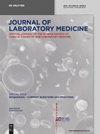Assessing the stability of uncentrifuged serum and plasma analytes at various post-collection intervals
IF 1.8
4区 医学
Q4 MEDICAL LABORATORY TECHNOLOGY
引用次数: 0
Abstract
Objectives Our study aimed to assess the stability of 26 biochemistry analytes in serum or plasma samples separated from blood samples centrifuged at different time intervals after collection, simulating sample transport via despatch delivery systems. Methods Blood from forty-one volunteers were collected using five serum separator tubes (SST) and five fluoride oxalate tubes (FOT) for each volunteer following written informed consent. Each of the five tubes in both groups of SST and FOT was centrifuged at one of the time intervals: 0.5 h, 4 h, 8 h, 12 and 24 h after collection. These samples were left standing prior to centrifugation at room temperature. We calculated the percentage difference for each analyte between the 0.5 h and other time intervals to assess analyte stability. The percentage difference was compared to the desirable specification for bias and reference change value (RCV). Results Mean concentration of serum potassium showed a significant increase in the percentage RCV after 8 h, while CKMB showed an increase after 12 h of delayed centrifugation compared to the baseline (0.5 h). There were no significant percentage RCV for the other analytes at all timelines. Conclusions Serum potassium and CKMB were stable up to 8 and 12 h of delayed centrifugation respectively whilst all other analytes appear stable up to 24 h, suggesting that sample transport delay of up to 8 h, with the condition that room temperature is maintained, may not have a significant impact on accuracy of the biochemistry/immunochemistry test results.评估未离心血清和血浆分析物在采集后不同时间段的稳定性
目的 我们的研究旨在评估从采集后不同时间间隔离心分离的血液样本中分离出来的血清或血浆样本中 26 种生化分析物的稳定性,模拟样本通过运送系统的运输过程。方法 在获得书面知情同意后,使用五支血清分离管(SST)和五支草酸氟化物管(FOT)采集 41 名志愿者的血液。在采集后的 0.5 小时、4 小时、8 小时、12 小时和 24 小时的时间间隔内,对 SST 和 FOT 两组的五支试管中的每支试管进行离心。离心前,这些样本在室温下静置。我们计算每种分析物在 0.5 小时和其他时间间隔之间的百分比差异,以评估分析物的稳定性。将百分比差与偏差和参考变化值(RCV)的理想规范进行比较。结果 血清钾的平均浓度在 8 小时后显示 RCV 百分比显著增加,而 CKMB 在延迟离心 12 小时后显示比基线(0.5 小时)增加。其他分析物在所有时间段的 RCV 百分比均无明显变化。结论 血清钾和 CKMB 分别在延迟离心 8 小时和 12 小时内保持稳定,而所有其他分析物在 24 小时内保持稳定,这表明在保持室温的条件下,样本运输延迟 8 小时可能不会对生化/免疫化学检验结果的准确性产生重大影响。
本文章由计算机程序翻译,如有差异,请以英文原文为准。
求助全文
约1分钟内获得全文
求助全文
来源期刊

Journal of Laboratory Medicine
Mathematics-Discrete Mathematics and Combinatorics
CiteScore
2.50
自引率
0.00%
发文量
39
审稿时长
10 weeks
期刊介绍:
The Journal of Laboratory Medicine (JLM) is a bi-monthly published journal that reports on the latest developments in laboratory medicine. Particular focus is placed on the diagnostic aspects of the clinical laboratory, although technical, regulatory, and educational topics are equally covered. The Journal specializes in the publication of high-standard, competent and timely review articles on clinical, methodological and pathogenic aspects of modern laboratory diagnostics. These reviews are critically reviewed by expert reviewers and JLM’s Associate Editors who are specialists in the various subdisciplines of laboratory medicine. In addition, JLM publishes original research articles, case reports, point/counterpoint articles and letters to the editor, all of which are peer reviewed by at least two experts in the field.
 求助内容:
求助内容: 应助结果提醒方式:
应助结果提醒方式:


